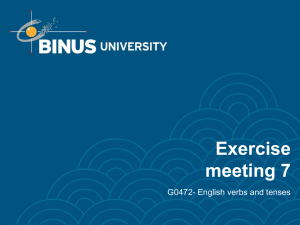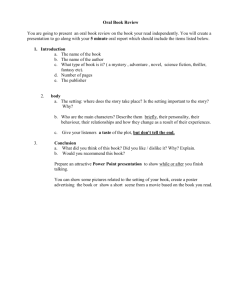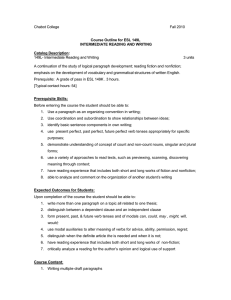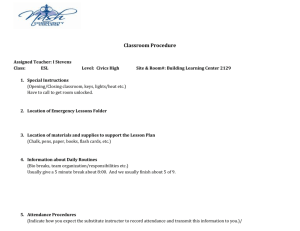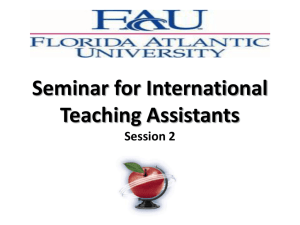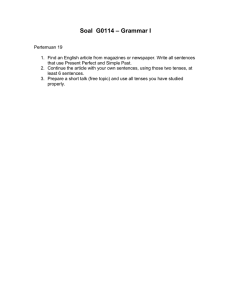Using the English Tense System
advertisement
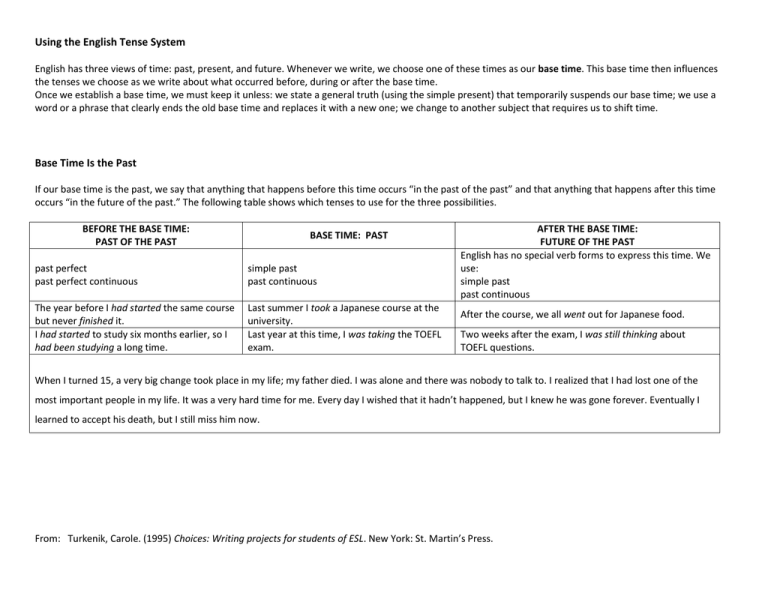
Using the English Tense System English has three views of time: past, present, and future. Whenever we write, we choose one of these times as our base time. This base time then influences the tenses we choose as we write about what occurred before, during or after the base time. Once we establish a base time, we must keep it unless: we state a general truth (using the simple present) that temporarily suspends our base time; we use a word or a phrase that clearly ends the old base time and replaces it with a new one; we change to another subject that requires us to shift time. Base Time Is the Past If our base time is the past, we say that anything that happens before this time occurs “in the past of the past” and that anything that happens after this time occurs “in the future of the past.” The following table shows which tenses to use for the three possibilities. BEFORE THE BASE TIME: PAST OF THE PAST BASE TIME: PAST past perfect past perfect continuous simple past past continuous The year before I had started the same course but never finished it. I had started to study six months earlier, so I had been studying a long time. Last summer I took a Japanese course at the university. Last year at this time, I was taking the TOEFL exam. AFTER THE BASE TIME: FUTURE OF THE PAST English has no special verb forms to express this time. We use: simple past past continuous After the course, we all went out for Japanese food. Two weeks after the exam, I was still thinking about TOEFL questions. When I turned 15, a very big change took place in my life; my father died. I was alone and there was nobody to talk to. I realized that I had lost one of the most important people in my life. It was a very hard time for me. Every day I wished that it hadn’t happened, but I knew he was gone forever. Eventually I learned to accept his death, but I still miss him now. From: Turkenik, Carole. (1995) Choices: Writing projects for students of ESL. New York: St. Martin’s Press. Base Time Is the Present If our base time is the present, we say that anything that happens before this time occurs “in the past of the present” and that anything that happens after this time occurs “in the future of the present.” The following table shows which tenses to use for the three possibilities. BEFORE THE BASE TIME: AFTER THE BASE TIME: BASE TIME: PRESENT PAST OF THE PRESENT FUTURE OF THE PRESENT present perfect simple present simple future present perfect continuous present continuous future continuous She has lived there since 1990. Jessica lives in a very small apartment. She is going to look for a bigger place next month. He has been writing letters and making phone Jonathan is looking for a job. Probably he will still be looking two months from now. calls. Have you ever noticed how many words you say in one day? Have you ever measured how much time passes between closing your mouth and opening it? Many people speak from morning to night. They are afraid of silence. The think it means emptiness and that makes them feel helpless. But I think silence is beautiful. By letting my mouth rest, I can listen to the dancing of the wind and the singing of the water. I can listen to the small, clear sounds in my brain as I consider my problems. Silence is a free time in which I can create anything I want. In silence I am the master, the emperor. Nobody can defeat me; I have the power to shape my dreams. Base Time Is the Future If our base time is the present, we say that anything that happens before this time occurs “in the past of the future” and that anything that happens after this time occurs “in the future of the future.” The following table shows which tenses to use for the three possibilities. BEFORE THE BASE TIME: AFTER THE BASE TIME: BASE TIME: FUTURE PAST OF THE FUTURE FUTURE OF THE FUTURE English has no special verb forms to express this time. We future perfect simple future use: future perfect continuous future continuous simple future future continuous She will have taken more than 30 courses and Lydia will graduate from college in 1999. After graduation, she will travel for a year or two. written 50 essays. We will have been traveling for two weeks. Next month at this time we will be flying to We will be staying with friends, so we will have a car. Caracas. Yesterday I handed out the reading list for this course. Next week we will discuss the first article on the list. By then, everyone should have finished reading it. You will also write a one-paragraph summary of the article which I will collect and grade. For the rest of the course, you will be responsible for one article each week so that by the end of the semester, you will have read, discussed, and summarized all the readings. From: Turkenik, Carole. (1995) Choices: Writing projects for students of ESL. New York: St. Martin’s Press.
